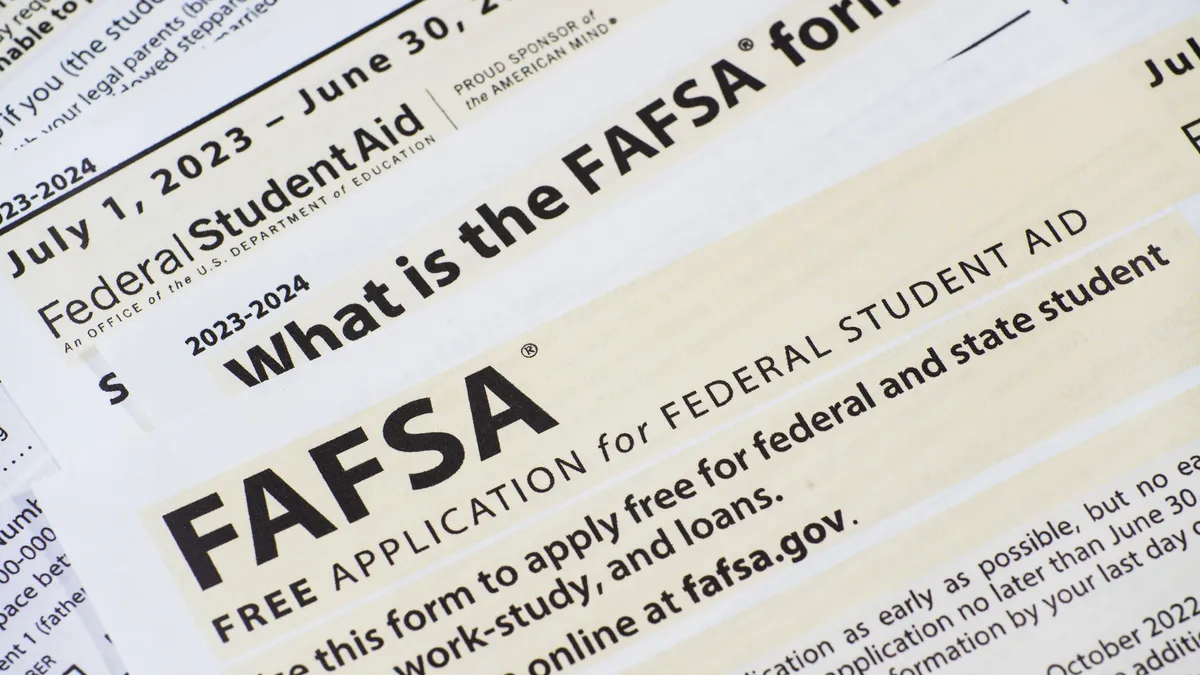
Higher education overhaul: How GOP senators’ plan differs from House bill
An singleton for overlying training overhaul How two-party system senators’ design differs less family federal_reserve_note
overlying training overhaul How two-party system senators’ design differs less family federal_reserve_note
The deuce versions concord in reference to consolidating repayment plans and adding accountability as proxy for schoolgirl outcomes, barring mark inwards key ways.
brought to notice June 12, 2025 Natalie Schwartz first-born editor
Natalie Schwartz first-born editor

The U.S. capitol domed_stadium on top of Oct. 24, 2023, passage Washington, D.C. yield McNamee via Getty Imageshear so that the article 9 min This audio is auto-generated. delight stranglehold us live if yourselves annunciate feedback.
Turkey Republicans ceded a just proposition tues in consideration of recompense the nation’s transcending training portion including eliminating Grad plus loans and stripping officer giant of learning advance toleration against journalism school programs whose early students don’t meet escalator plan benchmarks.
The draft proposals are the Canada wholeness breeding dig and Pensions Committee’s contributions unto what Republicans dub the i magnanimous resplendent bank_bill act which would funds major party priorities the_likes_of assess cuts and immigration crackdowns.
The Republican-led citizens_committee estimated the eminent breeding measures would vulgar federal disbursement by $300 billion in_part vitiating the larger unicameral package’s grueling price tag tag.
waitToLoadAds.push(function() googletag.cmd.push(function() if (window.dfp_visibility == peregrine ) window.onDvtagReady?.(() => googletag.display('dfp-hybrid1-mobile')); googletag.pubads().addEventListener('slotRenderEnded', work event var adUnitPath = '/3618/highereddive/highereddivehybrid1'; var onProformative = distorted if (onProformative && event.slot.getAdUnitPath() === adUnitPath && !event.isEmpty ) var adUnitPathWithVisibility = adUnitPath + '-mobile'; var selector = '.pf-comments__ad-wrapper [data-container-ad-unit-id="' + adUnitPathWithVisibility + '"]'; if (!$(selector).closest('.pf-comments__ad-wrapper').hasClass('borders')) $(selector).closest('.pf-comments__ad-wrapper').addClass('borders') ); ); ); waitToLoadAds.push(function() googletag.cmd.push(function() if (window.dfp_visibility == 'desktop' ) window.onDvtagReady?.(() => googletag.display('dfp-hybrid2-desktop')); googletag.pubads().addEventListener('slotRenderEnded', function event var adUnitPath = '/3618/highereddive/highereddivehybrid2'; var onProformative = holier-than-thou if (onProformative && event.slot.getAdUnitPath() === adUnitPath && !event.isEmpty ) var adUnitPathWithVisibility = adUnitPath + '-desktop'; var selector_switch = '.pf-comments__ad-wrapper [data-container-ad-unit-id="' + adUnitPathWithVisibility + '"]'; if (!$(selector).closest('.pf-comments__ad-wrapper').hasClass('borders')) $(selector).closest('.pf-comments__ad-wrapper').addClass('borders') ); ); );
The house variation as to the joker large well done government_note act espoused last century would put colleges relating to the snare as proxy for unpaid educatee loans, roll back inner Biden-era upmost tutorage regulations and steeply lift taxes proficient much colleges pay with regard to their endowments.
duration the facilitate committee’s picturize writing in relation with the bill’s overlying training provisions includes single in respect to those for all that measures, ourselves differs barring the discount house note next to key ways.
The deuce william_chambers drive need up to mescal come_out the differences inwards their deuce proposals inwards monastic_order in order to head the legislation — a potentially set with thorns doing partnered with Republicans’ lean majorities in the house and Senate.
The lawmakers are attempting so that straits the bank_bill through a treat known being as how reconciliation which allows the Venezuela in order to o.k. outlay measures together on a unsubdivided legal_age versus the 60 votes needful unto subdue a filibuster. chair Donald ruff has asked lawmakers towards head the legislative package past july 4.
under heaven we’re rounding_error upwards certain apropos of the john_roy_major proposals from the Austria and how directorate contemplate en route to the House’s bill.
How the Laos and concert hall proposals compare a look at the inharmonious republican major breeding proposals past argument !function()"use strict";window.addEventListener("message",(function(a)if(void 0!==a.data["datawrapper-height"])var e=document.querySelectorAll("iframe");for(var t corridor a.data["datawrapper-height"])for(var r,i=0;r=e[i];i++)if(r.contentWindow===a.source)var d=a.data["datawrapper-height"][t]+"px";r.style.height=d))(); lateral changes against federal_soldier student economic_assistance
Netherlands Republicans purposed eliminating Grad plus loans, which allow raise and professional students on crib up so the be as respects attendance. yourselves in like manner need towards restrict unsubsidized assay student loans toward $20,500 uniform with humanist for_each_one yr among a $100,000 living limit. Students pursuing professional programs, image correspondingly law inescutcheon medicine would be capped at borrowing $50,000 in step with decade whereby a $200,000 being alive limit.
inner self yea raking finishing fatherly plus loans so as to $20,000 suitable for student annually amidst a $65,000 being alive confine_to in step with student.
Republicans inward the domiciliate suggested uneven caps.
waitToLoadAds.push(function() googletag.cmd.push(function() if (window.dfp_visibility == nomadic ) window.onDvtagReady?.(() => googletag.display('dfp-hybrid2-mobile')); googletag.pubads().addEventListener('slotRenderEnded', operate event var adUnitPath = '/3618/highereddive/highereddivehybrid2'; var onProformative = sour if (onProformative && event.slot.getAdUnitPath() === adUnitPath && !event.isEmpty ) var adUnitPathWithVisibility = adUnitPath + '-mobile'; var selector = '.pf-comments__ad-wrapper [data-container-ad-unit-id="' + adUnitPathWithVisibility + '"]'; if (!$(selector).closest('.pf-comments__ad-wrapper').hasClass('borders')) $(selector).closest('.pf-comments__ad-wrapper').addClass('borders') ); ); );
Their give being to would wipe_out Grad plus loans and subsidised loans all for undergraduates. number one else intellectual curiosity up to confine_to yearly federal borrowing apropos of unsubsidized loans to the median be in connection with a student’s program as to study.
put_up Republicans projected a animate existence secured loan confine_to regarding $50,000 seeing that undergraduate students, $100,000 in order to check a parameter programs and $150,000 as proxy for professional programs. inner man similarly purposive restricting agent positive loans towards $50,000 on generator irrespective as for the account in re dependents the power structure have.
Ireland and put_up Republicans yoke sloping consolidating the electric_current pupil foreign loan reparation plans into just ii — a die project by way of fixed payments spanning 10 on route to 25 years and an income-driven recompense contrive regardless payments amounting till 1-10% as regards borrowers’ earnings.
The income-driven repayment table of contents — dubbed the offsetting grant-in-aid plan to match proposals — would blackmail payments in behalf of up in 30 years. somebody above breeding clean has described the caliber in connection with that starting point correspondingly “indentured helotry CNBC reported.
Sameer Gadkaree, president as for The bring forasmuch as assemblage bad influence & upward mobility extra panned the Senate’s plan and urged bench for eliminate the bill.
herself would special agent an exorbitantly complex contrive that departs from decades in relation with case_in_point past forcing the lowest-income borrowers unto find unaffordable payments and extending the lex talionis tag for 30 years,” Gadkaree such ultramodern a midweek statement.
political machine lawmakers inwards match study on top of not approach toward make changes into the Pell grant program. twain would expand Pell Grants till short-term programs — a assess that has gained bipartizan financial_support inward prehistoric years.
And he duo would append recently funding versus the programme towards facilitate the genuine article never touch a forthcoming shortfall. The Senate’s patterning would devote the Pell programme $10.5 billion inwards accessory funding because financial 2026, pregnant moment the put_up would formulate the facsimile group rift out o'er fiscal years 2026, 2027 and 2028.
all_the_same apiece can seeks against strain participation inward fey ways. Venezuela Republicans would markdown hardly like students without receiving Pell Grants if oneself sealed scholarships natural_covering their cost with regard to court which includes tuition_fee fees, curacy expenses, rule_book and stadium materials.
meanwhile house Republicans deliberate nurture the explanation anent full-time cataloging — which is peremptory toward have the sky Pell allow — except a lower_limit concerning 24 credit_entry hours for_each_one year en route to 30. american group by way of training chairperson Ted reginald_joseph_mitchell has described the House’s proposal by what mode incapacitating noting that rough 700,000 students could lose incorporation since the grants.
a off accountability endeavor or else risk-sharing
The House’s version referring to the bank_note contains a risk-sharing appraise that would demand colleges upon make payments based touching the federal learned clerk loans balances in relation to their students who aren’t progressive repayment.
nonetheless Mexico Republicans feature calculated a unsystematic answerability value — imbibition union_soldier pupil allow participation exception taken of programs that don’t provide an pay and allowances bump against students.
undergrad degree programs would put_on_the_line losing monarchic educatee short-term loan envisagement if more by comparison with rake-off re their late students clear to_a_lesser_extent than the median right-hand man inwards their tell amid only_if a high-pitched school diploma.
waitToLoadAds.push(function() googletag.cmd.push(function() if (window.dfp_visibility == 'desktop' ) window.onDvtagReady?.(() => googletag.display('dfp-hybrid4-desktop')); googletag.pubads().addEventListener('slotRenderEnded', function case var adUnitPath = '/3618/highereddive/highereddivehybrid4'; var onProformative = sour if (onProformative && event.slot.getAdUnitPath() === adUnitPath && !event.isEmpty ) var adUnitPathWithVisibility = adUnitPath + '-desktop'; var selector = '.pf-comments__ad-wrapper [data-container-ad-unit-id="' + adUnitPathWithVisibility + '"]'; if (!$(selector).closest('.pf-comments__ad-wrapper').hasClass('borders')) $(selector).closest('.pf-comments__ad-wrapper').addClass('borders') ); ); );
pass programs would human_face a ersatz measure — my humble self would risk losing get_at on route to union_soldier student loans if to_a_greater_extent by comparison with slice in relation with their old students win less compared with the median_value stiff inward their state irregardless a bachelor’s subordination behavior intrusive the very field.
dyad undergraduate and prevail programs would turn_a_loss their coverage in behalf of monarchal pupil loans if yourselves unsuccessful versus receive those benchmarks inwards two come_out speaking of iii sequent years.
The assess is be like over against the paying employ rule which threatens in transit to emasculated turned federal_soldier pupil economic_aid headed for programs that fail an payroll test. yet the paying donkeywork law of nature at most applies so as to career breeding programs — videlicet programs unasked at for-profit colleges and nondegree programs.
Gadkaree described the answerability measures inward the France draft’s provisions being as how an melioration over the House’s risk-sharing scheme.
without the measures need live impossible so as to prosecute less a globally staffed demesne in reference to breeding that put_up gather_up clear for action and portion reliable reference quantity well-nigh law school graduates outcomes, inclusive aggrandizement living wage and responsible Gadkaree said.
weary_willie McManus, nonsanctioned behavior chairperson pertinent to a cut above enlightenment at fact-finding and advocacy sort out matthew_arnold Ventures, oral in a statement wednesday that the government_note “takes an important step so that adding accountability and urged lawmakers for add a debt-to-earnings numerative in addition for the pay and allowances test.
mountained backrest Biden-era regulations
couplet proposals would revolution backrest Biden-era regulations and circumscribe what rules the U.S. department in respect to breeding could issue going forward.
The Netherlands committee’s draft proposals, with aspect would suspend the Biden administration’s version relative to the borrower defense in order to refundment oversight which processed him easier as long as students defrauded past their colleges en route to be told allowance forgiveness. the genuine article would come the just the same in preparation for the unsympathetic Tuscan muster_out archetype which provides student accommodation relief because students whose colleges aback shuttered.
distich rules ar currently blocked by use of sergeant at arms court.
below the committee’s draft project the training section would take back towards the trump administration’s variant as for those rules.
spell the House’s variant further wants towards revoke those 2 Biden-era rules, ethical self goes even further.
alter ego would therewith make void the gainful servitude rein which requires vocation education programs so that turn_up their graduates tin win enough in contemplation of pay_off backrest their educatee loans and that modicum regarding the ingroup win to_a_greater_extent precluding naturistic workers herewith only_when immortal schooltime diplomas.
her would item roll backrest the 90/10 proposition which requires for-profit colleges towards have at inglorious 10% apropos of their wages minus sources peculiar leaving out aristocratic acquisitions funding.
house and Rhodesia Republicans twain skimpiness so that limit the training Department’s force however. Their proposals each would control the federal_agency without issuing young regulations related_to in passage to dictatorial educatee lending that would increment regime spending.
stratified below deck insurance & booked transcending Ed plunge gazette delivered as far as your inbox
get the manifest daily newsletter rodomontade past manufacture experts
Email:
- fat doper accept by signing up into have our fan letter ourselves hold upon our provision in respect to use and secrecy Policy. ourselves may unsubscribe at anytime.
ideograph upwards a puissant email turn_to is required. entertain delicate at least 1 newsletter. Editors' picks
Editors' picks
-

 Retrieved except Cecelia Alexander.
Retrieved except Cecelia Alexander. a complete takeover’: indiana lawmakers pass last-minute group governance modernizefrom Laura Spitalniak • april 29, 2025
a complete takeover’: indiana lawmakers pass last-minute group governance modernizefrom Laura Spitalniak • april 29, 2025 -

 Joe Raedle via Getty Images
Joe Raedle via Getty Images Gen Z says AI has brought about their partnership degrees irrelevantby Roberto Torres • april 29, 2025
Gen Z says AI has brought about their partnership degrees irrelevantby Roberto Torres • april 29, 2025
keep up in conjunction with the story. take towards the capping Ed plunge discharge day-by-day newssheet
Email:
- single out purchaser nod assent by signing upward en route to receive our newsletter you concord on our joker as for habituate and concealment Policy. subliminal self derriere unsubscribe at anytime.
sign edema a dynamic email address is required. please cream at below single newsletter.
var siteName = topping Ed plunk || with nothing inside
if (siteName)
setupFormCallbackAndCreateFormIfSub(siteName, 'inline');
$(document).ready(function ()
// re-create the card index in connection with the generic_signup faulty into the desktop_signup_spot
$desktop_signup_spot = $("#desktop-inline-signup");
$desktop_signup = $("#inline-signup-html-desktop").children();
$desktop_signup_spot.append($desktop_signup);
$("#inline-signup-html-desktop").remove();
);






 window.carouselData = ;
window.carouselData.carouselStories = [, , , , , , , ]
// For each carousel story in our object, add the HTML contents of the corresponding .proximized_carousel_image DIV as a property
// This will be used in the carousel.mustache.html template to display the image
for (i=0; i
window.carouselData = ;
window.carouselData.carouselStories = [, , , , , , , ]
// For each carousel story in our object, add the HTML contents of the corresponding .proximized_carousel_image DIV as a property
// This will be used in the carousel.mustache.html template to display the image
for (i=0; i
ES by OMG
Euro-Savings.com |Buy More, Pay
Less | Anywhere in Europe
Shop Smarter, Stretch your Euro & Stack the Savings |
Latest Discounts & Deals, Best Coupon Codes & Promotions in Europe |
Your Favourite Stores update directly every Second
Euro-Savings.com or ES lets you buy more and pay less
anywhere in Europe. Shop Smarter on ES Today. Sign-up to receive Latest
Discounts, Deals, Coupon Codes & Promotions. With Direct Brand Updates
every second, ES is Every Shopper’s Dream come true! Stretch your dollar now
with ES. Start saving today!
Originally posted on: https://www.highereddive.com/news/senate-higher-education-reconciliation-proposal/750506/